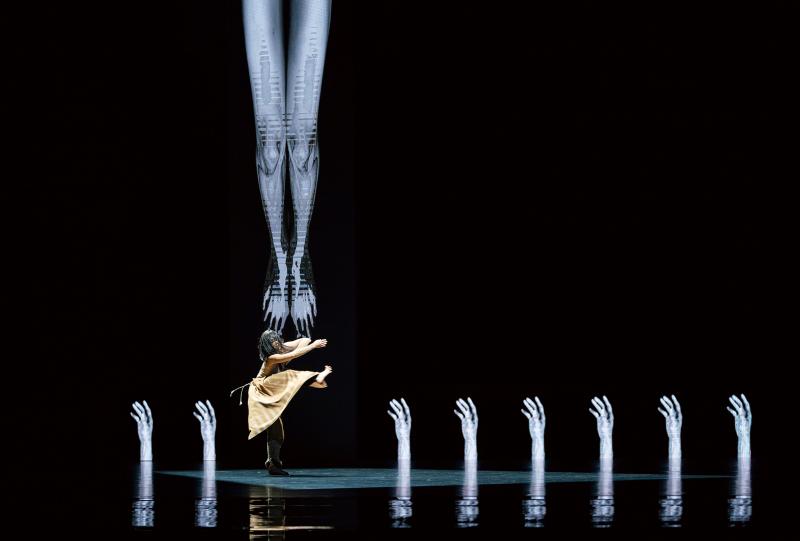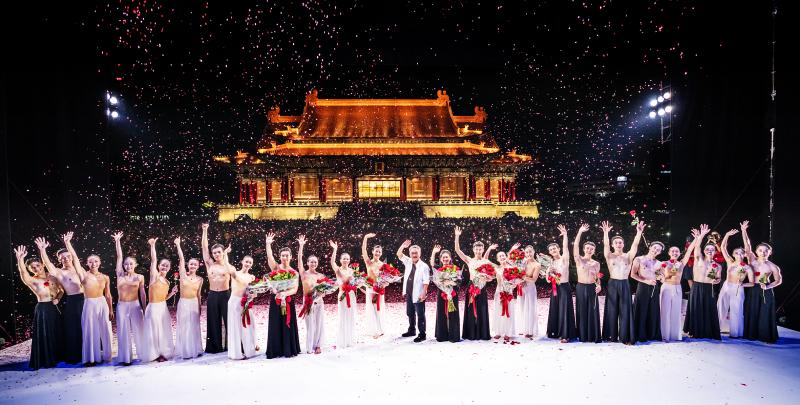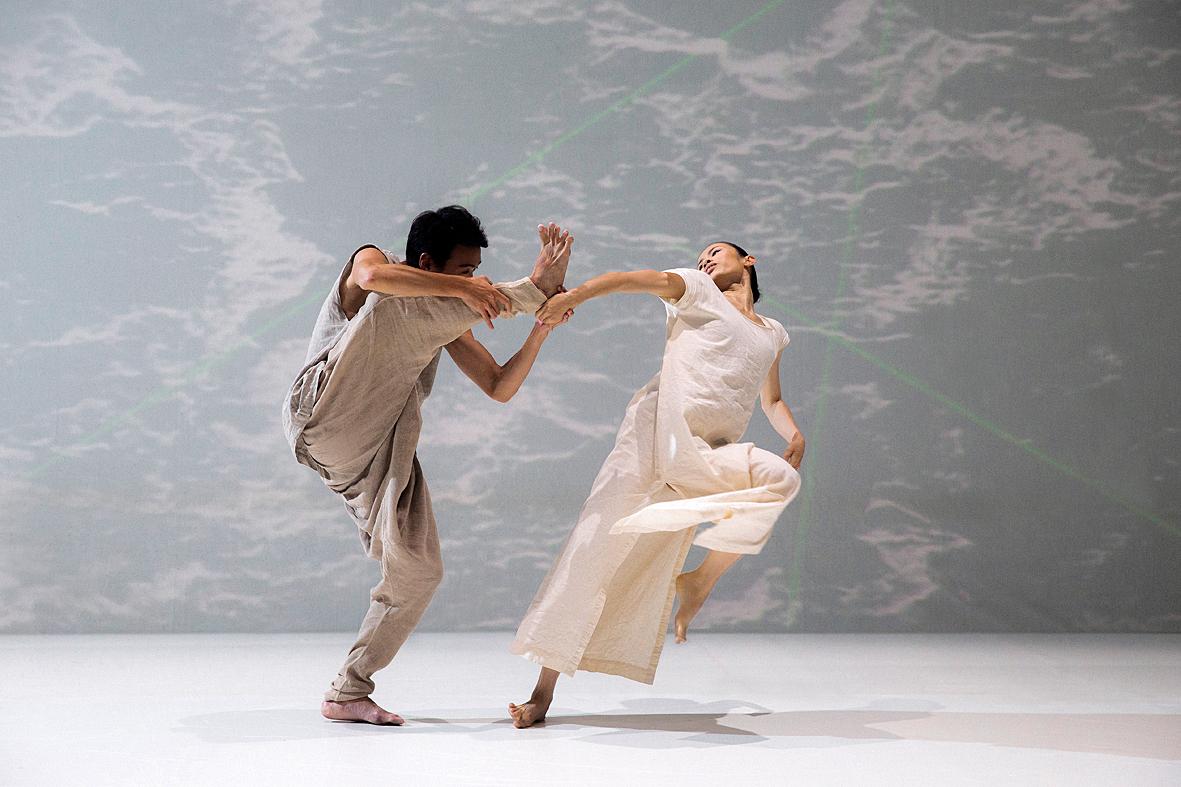Like so many other rites of passage that have fallen by the wayside in this COVID-19 ravaged year, Cloud Gate Dance Theatre of Taiwan’s (雲門舞集) traditional summertime outdoor performances at Taipei’s Liberty Plaza and elsewhere around the nation have been canceled.
It is not that Cloud Gate and its long-time sponsor Cathay Financial Holdings did not believe that they could run a tightly organized show tomorrow night with audience members seated in appropriate social distancing arrangements for what would have been their 25th annual Cathay Arts Festival production.
They were certainly not anticipating a crowd of the size of the 50,000 that showed up on July 27 last year for the 45th Anniversary Gala Program to have a chance to see several senior dancers who were going to be retiring along with company founder and artistic director Lin Hwai-min (林懷民) at the end of last year — or even the 20,000 to 30,000 who have shown up in previous years.

Photo courtesy of Chang Chen-chou
With their well-trained staff and volunteers, Cloud Gate and Cathay Financial could have kept track of who was seated where, just as theaters have been doing for indoor performances, with audience members providing contact information, but the concern was about the people who would be milling about on the fringes of the seating area.
So the decision was made to turn this year’s festival into a digital premier, not of just one production, but two, and not just in Taiwan, but globally.
Starting tomorrow night at 8pm (GMT+8) via Cloud Gate’s, Cathay’s and the Public Television Service’s (PTS) YouTube channels, Lunar Halo (毛月亮), created for Cloud Gate 2 (雲門 2) by its then-artistic director Cheng Tsung-lung (鄭宗龍) will air, followed by Lin Hwai-min: A Retrospective.

Photo courtesy of Liu Chen-hsiang
While Cheng’s Lunar Halo will only be available for 24 hours, the Lin retrospective will remain online for seven days, until Saturday next week at 8pm.
Lunar Halo is an apt choice for a digital audience, as it explores human existence in an ever-changing digital world, questioning the need for physical bodies and senses when so many people now rely on their eyes and fingertips to experience games, films and the world.
Set to an ethereal soundtrack by Icelandic post-rock band Sigur Ros, the dancers move through a landscape of human body parts and color projections, presented on three massive LED screens through the technical and creative wizardry of visual designer Jam Wu (吳耿禎) and videographer Ethan Wang (王奕盛).

Photo courtesy of Liu Chen-hsiang
The dancers morph along with the video projections, creating beautiful images that are often equally intellectually and emotionally challenging.
Lunar Halo is also a good introduction to Cheng, Lin’s successor as Cloud Gate artistic director, for those who have not seen his work for Cloud Gate 2 and other companies. It also serves as a preview of his first full-length production for the reformatted company, Sounding Light (定光), which premieres Oct. 1 at the National Theater before going on tour to Kaohsiung and Taichung.
The Lin retrospective is basically the 45th Anniversary Gala Program, which premiered at the National Theater in November 2018, featuring the company’s dancers in some of their favorite roles of the past two decades, including 1997’s Portrait of the Families (家族合唱), 1998’s Moon Water (水月), 2001’s Cursive (行草) and Bamboo Dream (竹夢), 2006’s Wind Shadow (風.影) and 2013’s Rice (稻禾).
The programs can be viewed on Cloud Gate’s YouTube channel (cloudgate2020.piee.pw/T6HQ9), the troupe’s Vimeo (cloudgate2020.pse.is/SVG79), Cathay Financial’s YouTube channel(cathaylifecloudgate.piee.pw/QWSF4) and PTS’ YouTube channel (lihi1.com/xRejF).
Meanwhile, the second half of the Cathay Arts Festival — Dancing with Cloud Gate — will be held on weekends from Aug. 1 to Aug. 30, in Taoyuan, Hsinchu, Chiayi and Pingtung, and on Friday, Sept. 4 in Taitung.
Curated by Cheng, the program is designed to break down the barriers between performers and audiences by allowing people to interact with the company’s dancers in a variety of public spaces.
Admission is free, but limited due to safety issues and space restrictions. Advanced registration is required for all performances except for those in Chiayi.
More information is available in Mandarin and English on Cloud Gate’s Web site (www.cloudgate.org.tw).

Jacques Poissant’s suffering stopped the day he asked his daughter if it would be “cowardly to ask to be helped to die.” The retired Canadian insurance adviser was 93, and “was wasting away” after a long battle with prostate cancer. “He no longer had any zest for life,” Josee Poissant said. Last year her mother made the same choice at 96 when she realized she would not be getting out of hospital. She died surrounded by her children and their partners listening to the music she loved. “She was at peace. She sang until she went to sleep.” Josee Poissant remembers it as a beautiful

For many centuries from the medieval to the early modern era, the island port of Hirado on the northwestern tip of Kyushu in Japan was the epicenter of piracy in East Asia. From bases in Hirado the notorious wokou (倭寇) terrorized Korea and China. They raided coastal towns, carrying off people into slavery and looting everything from grain to porcelain to bells in Buddhist temples. Kyushu itself operated a thriving trade with China in sulfur, a necessary ingredient of the gunpowder that powered militaries from Europe to Japan. Over time Hirado developed into a full service stop for pirates. Booty could

Before the last section of the round-the-island railway was electrified, one old blue train still chugged back and forth between Pingtung County’s Fangliao (枋寮) and Taitung (台東) stations once a day. It was so slow, was so hot (it had no air conditioning) and covered such a short distance, that the low fare still failed to attract many riders. This relic of the past was finally retired when the South Link Line was fully electrified on Dec. 23, 2020. A wave of nostalgia surrounded the termination of the Ordinary Train service, as these train carriages had been in use for decades

Lori Sepich smoked for years and sometimes skipped taking her blood pressure medicine. But she never thought she’d have a heart attack. The possibility “just wasn’t registering with me,” said the 64-year-old from Memphis, Tennessee, who suffered two of them 13 years apart. She’s far from alone. More than 60 million women in the US live with cardiovascular disease, which includes heart disease as well as stroke, heart failure and atrial fibrillation. And despite the myth that heart attacks mostly strike men, women are vulnerable too. Overall in the US, 1 in 5 women dies of cardiovascular disease each year, 37,000 of them